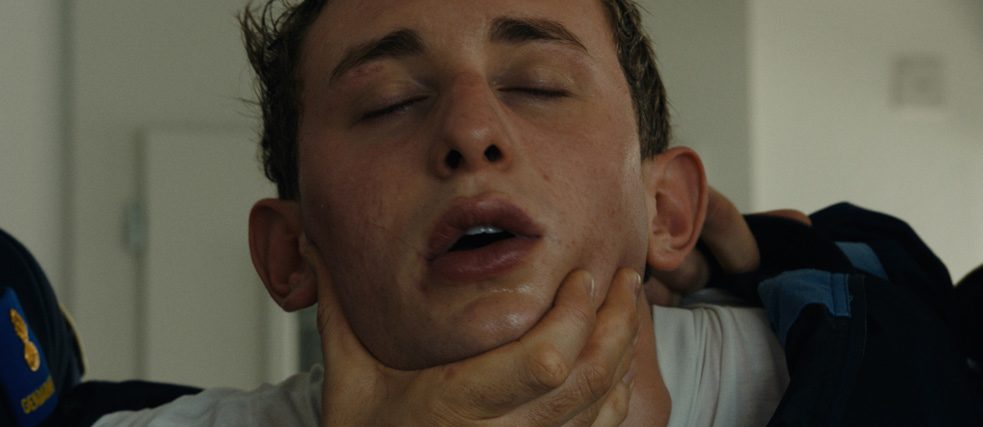Berlinale Blogger
Serienboom auf der Berlinale?

Has the current boom in drama series on TV affected the films shown at the Berlinale – in terms of subject-matter or narrative structure, for example? Our Berlinale Bloggers answer:
 Philipp Bühler – Germany: Eight years ago, Dominik Graf’s crime series In the Face of the Crime (Im Angesicht des Verbrechens) was the highlight of the Berlinale. Though no one wanted to watch it on TV afterwards. The same thing could happen this year to the Arte coproduction Shock Waves (Ondes de choc), in which Kacey Mottet Klein and Fanny Ardant’s performances made for really great cinema. But it’s to remain an experiment. No boom, please!
Philipp Bühler – Germany: Eight years ago, Dominik Graf’s crime series In the Face of the Crime (Im Angesicht des Verbrechens) was the highlight of the Berlinale. Though no one wanted to watch it on TV afterwards. The same thing could happen this year to the Arte coproduction Shock Waves (Ondes de choc), in which Kacey Mottet Klein and Fanny Ardant’s performances made for really great cinema. But it’s to remain an experiment. No boom, please!
 Camila Gonzatto – Brasil: The series boom is most conspicuous in the European Film Market, which has been banking on CoPro Series since 2015. The serial idiom is not yet as obvious in films, though with certain exceptions such as Wes Anderson’s Isle of Dogs with its episodic structure. Other idioms, such as that of games, have noticeably found their way into films in recent years, giving rise to hybrid narrative forms.
Camila Gonzatto – Brasil: The series boom is most conspicuous in the European Film Market, which has been banking on CoPro Series since 2015. The serial idiom is not yet as obvious in films, though with certain exceptions such as Wes Anderson’s Isle of Dogs with its episodic structure. Other idioms, such as that of games, have noticeably found their way into films in recent years, giving rise to hybrid narrative forms.
 Ahmed Shawky – Egypt: The most prominent change came basically from the new platforms for screening content (Netflix etc.). The new dynamics they created led to a quality upgrade of series produced and brought more big film names to work on TV series. This process is currently affecting the whole business and makes the presence of series in Berlinale a contemporary must.
Ahmed Shawky – Egypt: The most prominent change came basically from the new platforms for screening content (Netflix etc.). The new dynamics they created led to a quality upgrade of series produced and brought more big film names to work on TV series. This process is currently affecting the whole business and makes the presence of series in Berlinale a contemporary must.
 Sarah Ward – Australia: The contention that television is threatening film has long been a redundant one. There's room for new, engaging and innovative storytelling in both, and they can happily sit side-by-side — or combine in something unique, such as Twin Peaks: The Return. Berlinale's increasing recognition of TV is emblematic of that synergistic relationship, though for Australia in 2018, the festival finds more notable titles in television (film-to-TV efforts Picnic at Hanging Rock and Romper Stomper, plus new series Safe Harbour) than movies.
Sarah Ward – Australia: The contention that television is threatening film has long been a redundant one. There's room for new, engaging and innovative storytelling in both, and they can happily sit side-by-side — or combine in something unique, such as Twin Peaks: The Return. Berlinale's increasing recognition of TV is emblematic of that synergistic relationship, though for Australia in 2018, the festival finds more notable titles in television (film-to-TV efforts Picnic at Hanging Rock and Romper Stomper, plus new series Safe Harbour) than movies.
 Yun-hua Chen – China: Yes, several renowned filmmakers have invested themselves TV production, whether it’s the Coen brothers (The Ballad of Buster Scruggs), Michael Haneke (Kelvin’s Book). But what we see here is not so much a fierce competition between TV and film worlds, but rather the blurring of the line between them. Whether we look at Berlin, LA or Beijing, the exchange between TV and film industries in terms of cast, crew, investment, and audiences is bound to continue. This does not have to be a threat, but it forces us to find new answers to the question: What is a film?"
Yun-hua Chen – China: Yes, several renowned filmmakers have invested themselves TV production, whether it’s the Coen brothers (The Ballad of Buster Scruggs), Michael Haneke (Kelvin’s Book). But what we see here is not so much a fierce competition between TV and film worlds, but rather the blurring of the line between them. Whether we look at Berlin, LA or Beijing, the exchange between TV and film industries in terms of cast, crew, investment, and audiences is bound to continue. This does not have to be a threat, but it forces us to find new answers to the question: What is a film?"
 Gerasimos Bekas – Greece: The interesting thing about the series boom is the resulting transfer of know-how from cinema to smaller-scale productions. Some of the filmmakers I’ve been talking to are already working on serial formats on the side. This becomes noticeable not so much in the choice of subject-matter as in the fusion of formats and approaches.
Gerasimos Bekas – Greece: The interesting thing about the series boom is the resulting transfer of know-how from cinema to smaller-scale productions. Some of the filmmakers I’ve been talking to are already working on serial formats on the side. This becomes noticeable not so much in the choice of subject-matter as in the fusion of formats and approaches.
 Jutta Brendemühl – Canada: TIFF calls it Primetime, the Berlinale calls it Berlinale Series (a trailblazer in its 4th year). Canadian producer Damon D'Oliveira (Book of Negroes) is back at the Berlinale Market as one of Canada's Top 10 Producers, focusing on the EFM Drama Series Days. He is noticing new trends: "Grimy procedural stories involving dead, mutilated women are on their way out. But dystopian narratives seem to be thriving in the Trump era – see The Handmaid's Tale. And good serialized family/relationship narratives are in high demand now."
Jutta Brendemühl – Canada: TIFF calls it Primetime, the Berlinale calls it Berlinale Series (a trailblazer in its 4th year). Canadian producer Damon D'Oliveira (Book of Negroes) is back at the Berlinale Market as one of Canada's Top 10 Producers, focusing on the EFM Drama Series Days. He is noticing new trends: "Grimy procedural stories involving dead, mutilated women are on their way out. But dystopian narratives seem to be thriving in the Trump era – see The Handmaid's Tale. And good serialized family/relationship narratives are in high demand now."
Grace Barber-Plentie – Great Britain: While there’s lots of TV programmes in the programme as Berlinale, I actually haven’t seen any and I don’t think the TV boom has quite hit Berlinale yet. I do think it will be very interesting to see which films get picked up by Netflix after the festival, as the lines between film and TV are definitely becoming more blurred...
